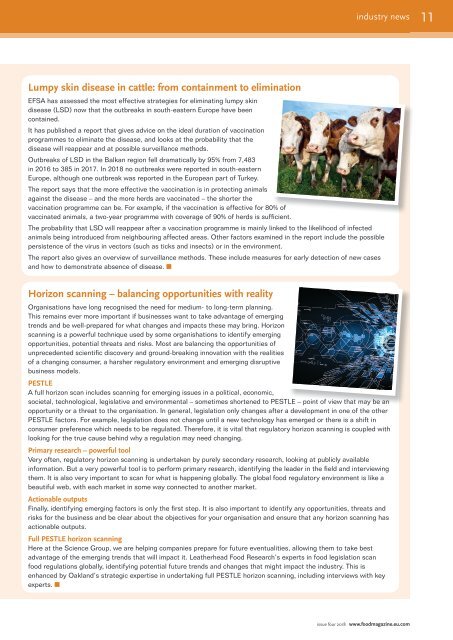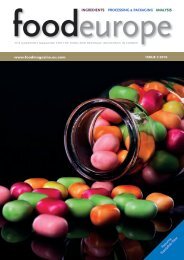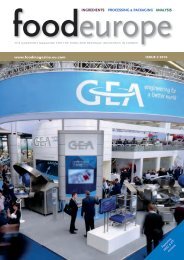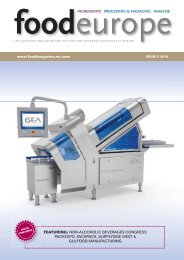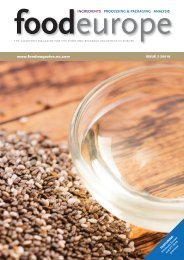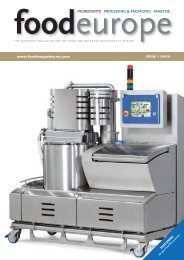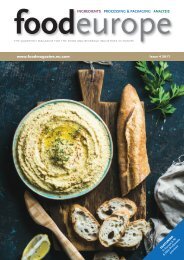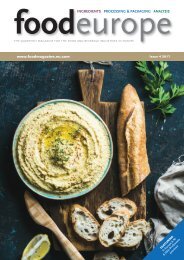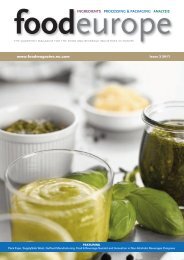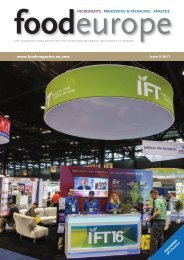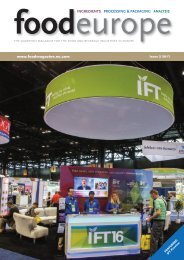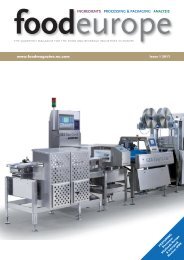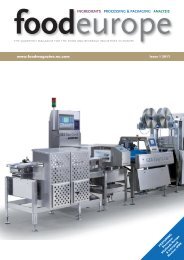Issue 4 2018
Create successful ePaper yourself
Turn your PDF publications into a flip-book with our unique Google optimized e-Paper software.
industry news<br />
11<br />
Lumpy skin disease in cattle: from containment to elimination<br />
EFSA has assessed the most effective strategies for eliminating lumpy skin<br />
disease (LSD) now that the outbreaks in south-eastern Europe have been<br />
contained.<br />
It has published a report that gives advice on the ideal duration of vaccination<br />
programmes to eliminate the disease, and looks at the probability that the<br />
disease will reappear and at possible surveillance methods.<br />
Outbreaks of LSD in the Balkan region fell dramatically by 95% from 7,483<br />
in 2016 to 385 in 2017. In <strong>2018</strong> no outbreaks were reported in south-eastern<br />
Europe, although one outbreak was reported in the European part of Turkey.<br />
The report says that the more effective the vaccination is in protecting animals<br />
against the disease – and the more herds are vaccinated – the shorter the<br />
vaccination programme can be. For example, if the vaccination is effective for 80% of<br />
vaccinated animals, a two-year programme with coverage of 90% of herds is sufficient.<br />
The probability that LSD will reappear after a vaccination programme is mainly linked to the likelihood of infected<br />
animals being introduced from neighbouring affected areas. Other factors examined in the report include the possible<br />
persistence of the virus in vectors (such as ticks and insects) or in the environment.<br />
The report also gives an overview of surveillance methods. These include measures for early detection of new cases<br />
and how to demonstrate absence of disease. n<br />
Horizon scanning – balancing opportunities with reality<br />
Organisations have long recognised the need for medium- to long-term planning.<br />
This remains ever more important if businesses want to take advantage of emerging<br />
trends and be well-prepared for what changes and impacts these may bring. Horizon<br />
scanning is a powerful technique used by some organishations to identify emerging<br />
opportunities, potential threats and risks. Most are balancing the opportunities of<br />
unprecedented scientific discovery and ground-breaking innovation with the realities<br />
of a changing consumer, a harsher regulatory environment and emerging disruptive<br />
business models.<br />
PESTLE<br />
A full horizon scan includes scanning for emerging issues in a political, economic,<br />
societal, technological, legislative and environmental – sometimes shortened to PESTLE – point of view that may be an<br />
opportunity or a threat to the organisation. In general, legislation only changes after a development in one of the other<br />
PESTLE factors. For example, legislation does not change until a new technology has emerged or there is a shift in<br />
consumer preference which needs to be regulated. Therefore, it is vital that regulatory horizon scanning is coupled with<br />
looking for the true cause behind why a regulation may need changing.<br />
Primary research – powerful tool<br />
Very often, regulatory horizon scanning is undertaken by purely secondary research, looking at publicly available<br />
information. But a very powerful tool is to perform primary research, identifying the leader in the field and interviewing<br />
them. It is also very important to scan for what is happening globally. The global food regulatory environment is like a<br />
beautiful web, with each market in some way connected to another market.<br />
Actionable outputs<br />
Finally, identifying emerging factors is only the first step. It is also important to identify any opportunities, threats and<br />
risks for the business and be clear about the objectives for your organisation and ensure that any horizon scanning has<br />
actionable outputs.<br />
Full PESTLE horizon scanning<br />
Here at the Science Group, we are helping companies prepare for future eventualities, allowing them to take best<br />
advantage of the emerging trends that will impact it. Leatherhead Food Research’s experts in food legislation scan<br />
food regulations globally, identifying potential future trends and changes that might impact the industry. This is<br />
enhanced by Oakland’s strategic expertise in undertaking full PESTLE horizon scanning, including interviews with key<br />
experts. n<br />
issue four <strong>2018</strong> www.foodmagazine.eu.com


